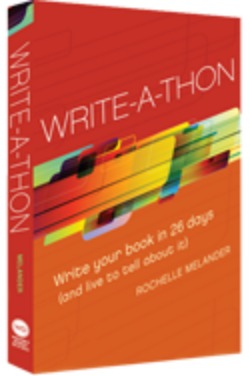 The following is an excerpt from Write-A-Thon: Write Your Book in 26 Days (And Live to Tell About It) by Rochelle Melander, now available from Writer’s Digest Books. Rochelle Melander is a certified professional coach and the author of 10 books, including a new book to help fiction and nonfiction writers write fast: Write-A-Thon: Write Your Book in 26 Days (And Live to Tell About It) (October 2011). Melander teaches professionals how to get published, establish credibility, and navigate the new world of social media. In 2006, Rochelle founded Dream Keepers Writing Group, a program that teaches writing to at-risk tweens and teens. Visit her online at www.writenowcoach.com.
The following is an excerpt from Write-A-Thon: Write Your Book in 26 Days (And Live to Tell About It) by Rochelle Melander, now available from Writer’s Digest Books. Rochelle Melander is a certified professional coach and the author of 10 books, including a new book to help fiction and nonfiction writers write fast: Write-A-Thon: Write Your Book in 26 Days (And Live to Tell About It) (October 2011). Melander teaches professionals how to get published, establish credibility, and navigate the new world of social media. In 2006, Rochelle founded Dream Keepers Writing Group, a program that teaches writing to at-risk tweens and teens. Visit her online at www.writenowcoach.com.
Get Rewards
Before the reward there must be labor. You plant before you harvest.
—Ralph Ransom
Credit card companies and airlines reward you with prizes for frequent use. Why shouldn’t you get a reward for amassing an embarrassing amount of words? Over the years, I’ve noticed that writers reward themselves in different ways. Here are some popular reward-types in the writing world:
The “I get the reward, then I write” writer. This writer loads up on treats—anything from fancy food to a hot bath—to prepare for a writing session. Think of it like shoring yourself up for a speaking gig or preparing for a hot date. If you find yourself saying some thing like this, you might be this kind of a writer: “If I get the triple shot mocha caramel latte with whipped cream, I’ll be sure to get the chapter written.”
The “I need something to motivate me while I write” writer. Like a child clinging to a teddy bear, his writer needs some sort of comfort to keep writing. Some choose food, others choose music, and a few want a real–live friend in the room. This writer says things like, “I’ll munch on this popcorn, then that chocolate bar, then drink that pot of coffee while I write, and the words will come faster.”
The “I’m going to stick it out and finish the word count before I have fun” writer. This writer knows how to both work hard and play hard. Sure, she will give up a morning coffee date or surfing the social media sites to get the word count in, but when it is done, she is ready for fun. She says, “When I finish this scene, I will play a computer game. Or buy a book. Or both.”
The “What? Reward myself? You have to be kidding? Writing is reward itself” writer. This is the person you hated in high school or college. They would study for hours, stopping only to run a marathon, and claim it was a blast. This writer finishes today’s word count and decides to write more.
Writers use rewards in multiple ways. No doubt, all of the techniques work. But one works better than the others. Can you guess which one?
Years ago, psychologists did a research study with children and marshmallows. They put four-year-old children alone in a room with a marshmallow. They told them that they could eat one marshmallow right away or they could wait a few minutes and get two marshmallows. The psychologists left the room. So, what happened? Some kids ate the single marshmallow. Some waited for the double dose. Here’s the cool thing: years later the psychologists learned that the children who had waited for the double dose out-paced their peers in school achievement and test scores.
What does this mean for you? Delayed gratification works. You’ll write more if you reward yourself after you finish your daily word count. Create a list of rewards that work for you. Keep it near the place you write. When you have met your daily writing goal, reward yourself. It’s that simple!







Leave a reply